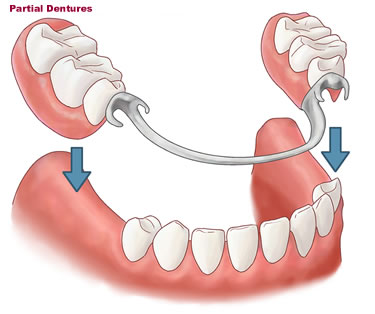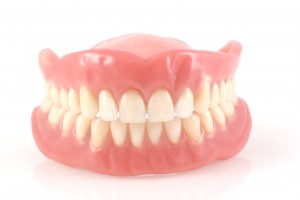Today, there are two available types of teeth prosthetics or dentures that you can have, depending on your needs. These include partial and complete dentures. Complete dentures are used for replacement of an entire set of teeth. Partial dentures on the other hand are used if there are gaps made in the sets of teeth because of missing teeth.
Partial dentures
Partial dentures are one of the most common forms of tooth replacement these days. A metal  skeletal framework is provided. It is then fitted on the mouth to fill in the gap. These removable dentures are anchored on the surrounding gums and teeth for support and retention, that’s why for optimum performance, you need to maintain the good and healthy condition of the surrounding teeth and gums so as to provide a sturdy anchorage and support for the dentures. Since the dentures are removable, these can be cleansed after meals. Albeit partial dentures are quite a reasonable alternative to replace missing teeth, there are a few hang-ups that pertain to them. You will be exposed to a greater risk for developing gum disease and tooth decay, plus you won’t be safe from bone loss beneath the placement of the dentures because it is removable. Orthodontists advice on removing the dentures before you go to bed and after you eat for cleansing.
skeletal framework is provided. It is then fitted on the mouth to fill in the gap. These removable dentures are anchored on the surrounding gums and teeth for support and retention, that’s why for optimum performance, you need to maintain the good and healthy condition of the surrounding teeth and gums so as to provide a sturdy anchorage and support for the dentures. Since the dentures are removable, these can be cleansed after meals. Albeit partial dentures are quite a reasonable alternative to replace missing teeth, there are a few hang-ups that pertain to them. You will be exposed to a greater risk for developing gum disease and tooth decay, plus you won’t be safe from bone loss beneath the placement of the dentures because it is removable. Orthodontists advice on removing the dentures before you go to bed and after you eat for cleansing.
Complete dentures
There are two types of complete dentures. These are the immediate and conventional types.  They are manufactured after the removal of the missing teeth and after the gum tissues surrounding it has been fully healed. The conventional dentures are placed in as little as 8-12 weeks when the damaged teeth have been removed. Immediate dentures on the other hand are made even before the damaged teeth have been removed. You won’t have to go around without teeth while your gums heal because they will be placed immediately after tooth extraction. But then again, gums and bone tissues tend to shrink with time, more so while the tissues concerned are on their healing period after removal of the teeth. A backlog of immediate dentures is that they call for more testing and adjustment so they would fit your oral cavity properly while the tissues are healing. They are deemed a temporary remedy until you are provided with conventional dentures.
They are manufactured after the removal of the missing teeth and after the gum tissues surrounding it has been fully healed. The conventional dentures are placed in as little as 8-12 weeks when the damaged teeth have been removed. Immediate dentures on the other hand are made even before the damaged teeth have been removed. You won’t have to go around without teeth while your gums heal because they will be placed immediately after tooth extraction. But then again, gums and bone tissues tend to shrink with time, more so while the tissues concerned are on their healing period after removal of the teeth. A backlog of immediate dentures is that they call for more testing and adjustment so they would fit your oral cavity properly while the tissues are healing. They are deemed a temporary remedy until you are provided with conventional dentures.
What are other alternatives that I can choose aside from dentures?
Instead of dentures, you can also be fitted with dental implants. These are used to retain dentures that are removable. For full fixed bridges, their main function is to replace dentures. Implants cost more than regular dentures but these and bridges as well resemble real teeth more closely. Bear in mind though that not all people can be fitted with dental implants, it’s case-to-case basis.
How will I determine which treatment of choice suits my needs?
All you have to do is get in touch with us at the Sydney Plastic Surgery. We will be happy to  schedule you for consultation. You will be guided throughout the entire treatment process by our leading specialist, Dr. Potres.
schedule you for consultation. You will be guided throughout the entire treatment process by our leading specialist, Dr. Potres.
